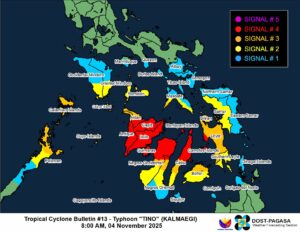THE Philippine private sector is scaling up investment in real-time disaster early-warning systems and digital infrastructure, the Organisation for Economic Co-operation and Development (OECD) said, but noted that telecommunication disruptions remain a challenge.
In a Development Policy Paper released on Monday, the OECD said the private sector has moved “beyond basic compliance” towards active co-participation in national resilience-building.
Republic Act (RA) 10121 or the Philippine Disaster Risk Reduction and Management (DRRM) Act of 2010 sets the framework for private-sector involvement in DRRM.
Meanwhile, RA 10639 or the Free Mobile Disaster Alerts Act of 2014, requires real-time alert dissemination by telecommunications operators.
“Rapid technological advancements and expanding digital infrastructures have created new avenues for private firms not only in the technology sector but across various industries to support and co-invest in the development and operationalization of real-time warning capabilities,” OECD said in the policy paper.
The paper was issued during the passage of Super Typhoon Uwan, which made landfall during the weekend.
The OECD noted that only 65% of local government units have DRRM plans aligned with updated risk assessments.
Despite over 95 million users receiving alerts in 2022 under RA 10639, their impact remains uneven due to poor last-mile delivery, patchy signal in remote areas, and weak alignment with local disaster protocols, it said.
It also noted that disasters often damage communication infrastructure, leading to the failure of early warning systems when they are most needed, as seen during Typhoon Odette in 2021.
“This highlights a key paradox: early warning systems are not truly ‘early’ if communications fail once the hazard strikes,” the OECD said.
“Building resilient and redundant communication channels is therefore essential, particularly in geographically isolated and disadvantaged areas where coverage is already limited even under normal conditions,” it added.
Other problems include data and platform fragmentation among multiple agencies such as the government weather service, known as PAGASA, and the government volcanology service, known as PhiVolcs, and the Office of Civil Defense. — Aubrey Rose A. Inosante

